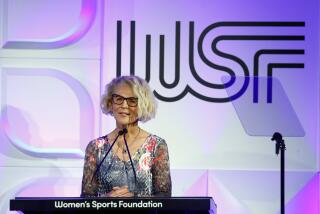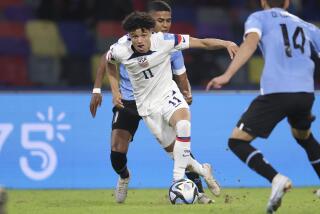Eager Stork Hoping to Deliver at Seoul
- Share via
Jeff Stork is ready to take flight.
Grounded most of last year by a torn patella tendon in his right knee, Stork is in position to deliver the sets as the U.S. men’s volleyball team prepares to defend its Olympic championship next year in Seoul, South Korea.
The former All-City and All-American setter from Taft High and Pepperdine moved into the Americans’ starting lineup last October after Dusty Dvorak left to play for a club team in Italy.
A month later, he won the Nekoda Award as the tournament’s best setter as the United States won the eight-team Japan Cup.
“I don’t think there will be any problem with me starting,” said Stork, who probably will be a permanent fixture in the U.S. lineup through the Seoul Olympics. “I feel pretty confident because of my experience, and I’m getting stronger all the time.”
With Dvorak gone, Stork’s major goal in 1987 is to stay out of the hospital.
Stork, 26, joined the team in 1985, started for several months in Dvorak’s absence, then returned to the bench when Dvorak, the Olympic starter, rejoined the team after about a 10-month hiatus.
Dvorak then led the Americans to the World Cup championship in 1985 and the world championship last October as the Olympic champions completed a sweep of volleyball’s three most important tournaments.
Meanwhile, Stork nursed his knee injury, which sidelined him for four months beginning last February. He played in all the major tournaments later in the year but was used sparingly.
Although it was a great year for the team, Stork said, “it was kind of disappointing for me because I thought I had a good chance of starting, and then I got injured. That pretty much blew my chance.”
But the year wasn’t a total washout, Stork said. Last July, he married the former Sabine Stein, a former Cal State Northridge volleyball player.
As the U.S. team prepares to open its 1987 season with a series of matches against China, including a Feb. 7 stop at UC Irvine, Stork said his knee feels fine. In the six weeks since the Japan Cup, he has played on the beach so as not to put too much pressure on the tendon.
He’s waited a long time for this opportunity, so “I’m taking it a little slower,” he said.
Naturally, Stork is looking ahead. He wants to deliver when it matters most--in the Olympics.
More to Read
Go beyond the scoreboard
Get the latest on L.A.'s teams in the daily Sports Report newsletter.
You may occasionally receive promotional content from the Los Angeles Times.







